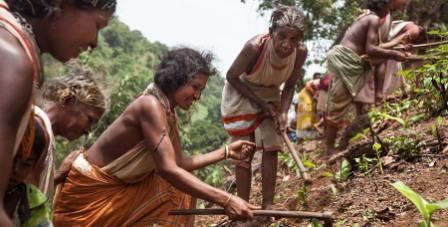Bhawanipatna: The Covid-19 pandemic has significantly impacted all sectors in the country. Its far reaching effect is also felt in the Niyamgiri hill, the home to Dongria Kondh tribal, one of the primitive tribes in the state, a report said.
The pandemic has impacted the primitive tribals to a great extent by snatching away their livelihood. This has pushed them into distress sale. The minor forest produces they sale to earn a living has few takers these days after the outbreak of the pandemic.
Also Read: Revenue Minister, SRC review flood situation in Malkangiri
The Dongria Kondhs comprising 2,075 families live on the Niyamgiri hill which is spread over Kalahandi and Rayagada districts. The Kondhs living on the Niyamgiri hill sustain themselves from the resources of the Niyamgiri forests, practising horticulture and shifting cultivation.
The subsequent lockdown announced in the country to contain the spread of the coronavirus has led to an immediate, alarming loss of income for the tribal communities, raising the spectre of impending hunger. 75
The Dongria Kondhs– among the particularly vulnerable tribal groups have been struggling to sustain their livelihood after the lockdown abruptly closed their traditional marketplaces.
The Dongria Kondhs are innocent, honest in nature and never have the habit to bow or beg before others to earn a living, said a social activist. “They work hard in collecting minor forest produce and practise shifting cultivations which sustain them and their families all round the years.”
The means of earnings of the tribals are varied in nature. They cultivate vegetables, raggi, maize, corn, some indigenous varieties of pulses, ginger, alsi, turmeric, mangoes, pineapples oranges and tamarinds.
They also prepare leaf plates, brooms, bamboo products collect honey, raisins, medicinal herbs and mushrooms and sell them in the local market to earn a living. However, the coronavirus induced lockdown and subsequent shutdown have broken their backbone by snatching away their livelihood.
This has happened as all the local haats have remained closed due to the lockdown and subsequent shutdown. Moreover, the fear of getting infected by coronavirus has prevented people to buy anything from the tribals.
As a result, the tribals are now forced to sell their produce at a throwaway price to private traders or to the households during the lockdown. The Dongria Kondhs are traditionally dependent on forest resources for survival.
Sale of minor forest produce is a critical source of livelihood, especially during the pre-monsoon dry season of March to June, when chances of availing alternative sources of income are slim.
A dozen of banana which earlier used to be sold at Rs 40-50 is now being sold at Rs 10. The sale of Karadi which is a flavoured delicacy of the tribals and local residents has also declined. The Dongria women who earlier used to sell a bundle of Karadi for Rs 10 are now selling three bundles for Rs 10.
Observers and intellectuals have demanded the state government to intervene and make alternative arrangements for the livelihood of the tribals.
PNN
